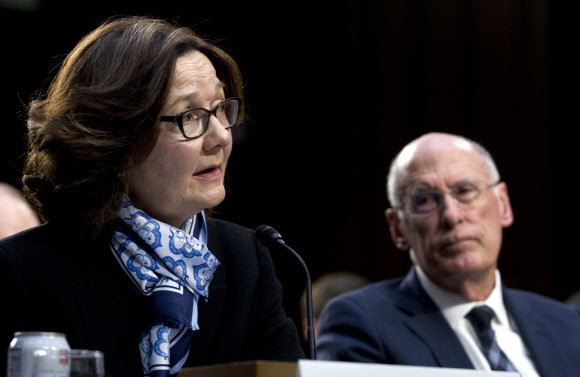 |
|
Dan Coats (right), director of National Intelligence listens to the remarks of CIA Director Gina Haspel at a US Senate hearing on Jan. 29.
|
Director of National Intelligence claims Pyongyang still maintains capacity for WMD production
The US intelligence community has acknowledged that while North Korean leader Kim Jong-un may be showing an openness to the possibility of denuclearization, it is unlikely that Kim will give up nuclear weapons entirely. Ahead of the second North Korea-US summit, this represents a reiteration of the US intelligence community’s evaluation from last year. Dan Coats, director of National Intelligence, a role that commands all 16 of the US Intelligence Agencies, CIA Director Gina Haspel, and NSA Director Paul Nakasone, among others, testified at a US Senate hearing on Jan. 29. The intelligence agency chiefs also released a report titled the “Worldwide Threat Assessment of the US Intelligence Community” containing such opinions. Coats, through statements in the hearing and the report, said that North Korea has not test-fired nuclear-capable missile or conducted a nuclear test for over a year. Coats has also publicly declared his support for denuclearization on the Korean peninsula, saying the North has dismantled part of its WMD facilities, although not irreversibly. The National Intelligence director has judged that Kim Jong-un continues to demonstrate his openness to denuclearization on the Korean peninsula. In her responses, Haspel, even while warning that the North Korean government “is committed to developing a long-range nuclear-armed missile that would pose a direct threat to the United States,” added that it was a positive sign that North Korea was persuaded to engage in dialogue, and that it had voluntarily taken measures to shut down and dismantle its (facility) sites. However, Coats also revealed that North Korea still maintains its capacity for weapons of mass destruction, and that the intelligence community does not believe that North Korea would give up its stockpile of weapons, its delivery system, or its capacity for weapons production. The reason for this, he argued, was that North Korean leaders believe that nuclear weapons are of crucial importance in the survival of the regime. Coats continued that North Korea is pursuing negotiations for partial denuclearization so that they may receive concessions from the US and the international community. In such a situation, the intelligence community does not believe that North Korea would fully give up its nuclear weapons and production capacity. Coats maintains that the North’s activities continue to directly contradict the goal of total denuclearization. The New York Times interpreted the report as a hit against Trump, reporting that “Intelligence Chiefs contradicted Trump” on his key diplomatic policies. In addition, the US Congressional Research Service (CRS), in a recently released report, also took the stance that despite limited diplomatic achievements, many experts in both the US and South Korea remain doubtful about the denuclearization of North Korea as North Korea has not agreed to release a list of its nuclear assets and facilities, nor has it agreed to international verification for its denuclearization. By Hwang Joon-bum, Washington correspondent Please direct comments or questions to [english@hani.co.kr]






